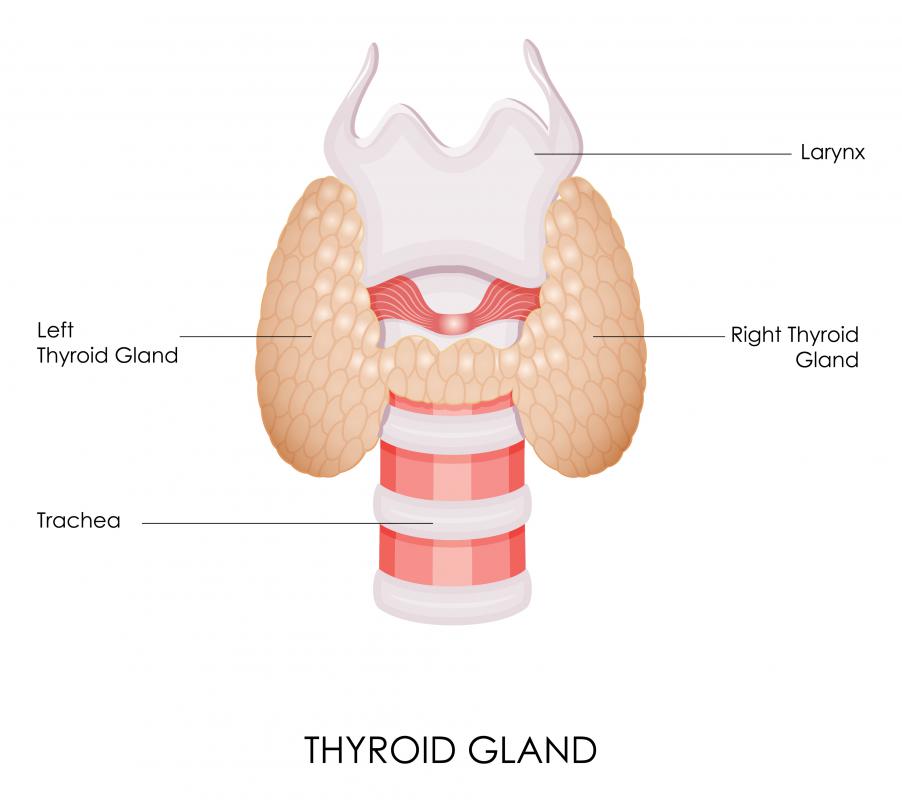At TheHealthBoard, we're committed to delivering accurate, trustworthy information. Our expert-authored content is rigorously fact-checked and sourced from credible authorities. Discover how we uphold the highest standards in providing you with reliable knowledge.
What is Acute Thyroiditis?
Acute thyroiditis is a rare type of bacterial infection that affects the thyroid gland. Pathogens embed within the gland and create an inflamed, pus-filled abscess. As a result, a person is likely to have swelling and tenderness in the neck as well as body-wide symptoms of fever and fatigue. A doctor can run a series of tests to determine whether symptoms are truly related to acute thyroiditis or a more serious chronic condition such as thyroid cancer. Most cases of acute thyroiditis can be easily remedied with antibiotics, though surgery may be necessary if the gland is seriously damaged by the abscess.
The thyroid gland is an uncommon site for bacterial infection. When an acute case of thyroiditis does occur, it is usually secondary to an infection in the throat, mouth, or lungs. Bacteria can migrate to the thyroid from other parts of the body as well. Many different pathogens can potentially lead to thyroiditis, but the most common are strains of Streptococcus and Staphylococcus. People who have weakened immune systems due to old age or a chronic condition such as AIDS are at the highest risk of infection.

Symptoms of acute thyroiditis tend to come on quickly. The first signs of illness may include a high fever, chills, a hoarse voice, and a sore throat. A person may also have difficulty swallowing food or liquids. As an abscess grows, it can lead to a palpable lump on one side of the neck that is tender to the touch. The neck lump is usually painless, though it may cause dull, radiating aches down the neck when the head is tilted to one side.

Left untreated, acute thyroiditis can lead to serious complications. Infection can spread from the abscess to the bloodstream and possibly to the brain, which may lead to a life-threatening emergency. Hyperthyroidism, or overactivity of the thyroid gland, can also occur. Possible signs of hyperthyroidism include uncontrollable sweating, insomnia, rapid heart rate, and high blood pressure.

Acute thyroiditis is usually discovered and treated before major complications arise. Standard oral antibiotics taken for two weeks to one month are sufficient to clear up most bacterial infections. If a cyst in the neck is especially large and tender, a doctor may choose to drain it with a hollow needle. During recovery, patients are encouraged to rest and drink plenty of fluids to relieve symptoms. A follow-up visit once antibiotic treatment is complete can confirm that infection is entirely resolved.
AS FEATURED ON:
AS FEATURED ON:

















Discussion Comments
I developed sore throat a month ago. Later I noticed a lump in my throat which causes severe pain in my neck radiating to ears, teeth and TMJ. When I sneeze, the pain intensifies. Associated symptoms are body aches, fever and fatigue. My TSH levels are too low, but the T3 and T4 are normal. A thyroid scan shows a nodule.
Could acute thyroiditis be transient thyroiditis and disappear on its own?
I had a strep throat infection recently and immediately after, I was diagnosed with acute thyroiditis. My doc has put me on medications again. But I read on a couple of forums that the thyroid can be inflamed for a short time after a strep infection. And once the strep is treated with antibiotics, the thyroid should go back to normal too. Apparently, this also happens with some women immediately after giving birth.
I guess I'm curious if I'm taking medications for no reason right now. Has anyone else experienced acute thyroiditis symptoms because of strep? How long did it take after your strep treatment for your thyroid gland to go back to normal?
@turquoise-- You're right it can be a little confusing. I'm no expert but will try to explain as best as I can.
Any time that the thyroid gland is inflamed, it's called thyroiditis. This doesn't tell us much about the cause of the inflammation or how quickly it came about though.
The term "acute" in medical terms refers to an illness that comes about very quickly and could become serious if it's not treated. So both subacute and acute thyroiditis come about very suddenly.
The difference between the two is that acute thyroiditis is caused by an infection and subacute is not. Subacute can be caused by a lack of or too much of thyroid hormones in the blood (hyperthyroidism and hypothyroidism). Acute thyroidism can only be caused by an infection and it's usually a bacterial one.
My daughter came down with a sudden fever last week and also said that her throat hurt when she touched it. After a physical examination and a couple of blood tests at the doctor's office, we came to know that it's acute thyroiditis. She was prescribed antibiotics and is doing better now.
While we were leaving the doctor's office, he also mentioned that this a pretty uncommon condition and that's it's good we caught it early on. That kind of worried me and I've been trying to learn more about this disease. There are a lot of different terms out there for thyroiditis. There is just "thyroiditis," "subacute thyroiditis," and "acute thyroiditis."
I'm pretty confused about the differences between these. What makes a thyroiditis, subacute or acute?
Post your comments